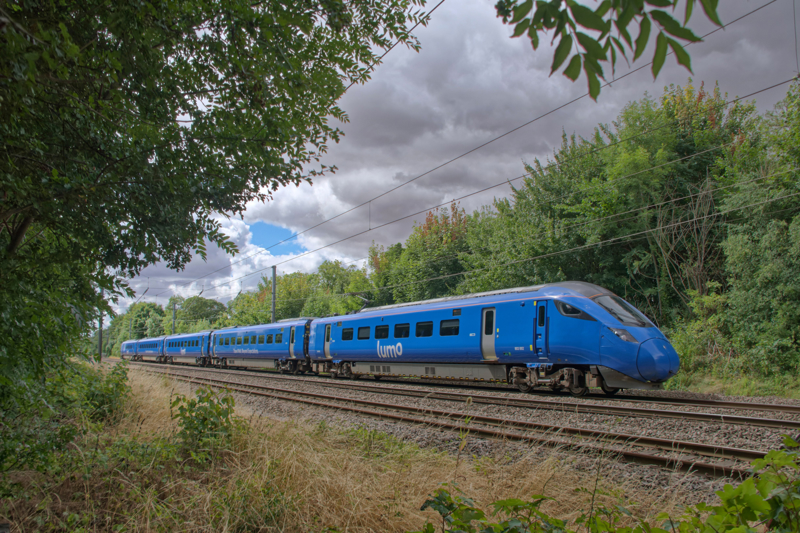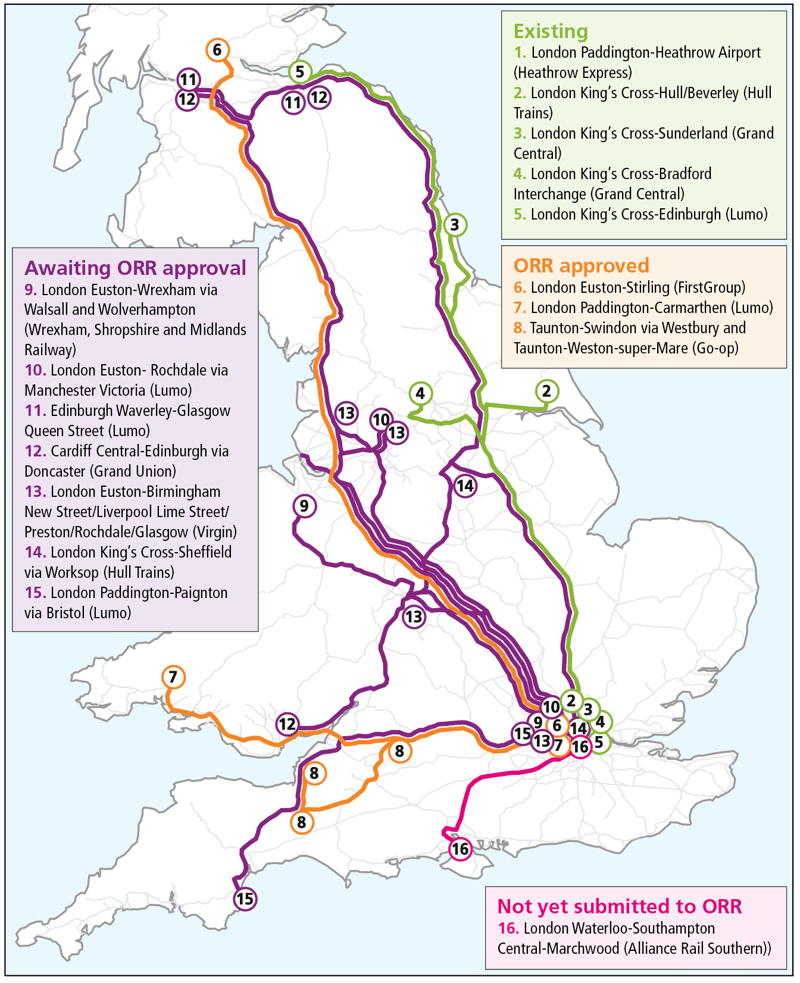
The Department for Transport has opposed eight out of nine open access applications currently with the Office of Rail and Road (ORR).

The Department for Transport has opposed eight out of nine open access applications currently with the Office of Rail and Road (ORR).
In a letter sent to the regulator’s Head of Access and Licensing, Gareth Clancy, DfT said that only one – SLC Rail and Alstom’s Wrexham, Shropshire and Midlands Railway (WSMR) – meets the ‘Not Primarily Abstractive’ (NPA test).
ORR policy is for applications to have an NPA ratio of 0.3 or greater. DfT claims its analysis found NPA rations of 0.26 (Hull Trains, London King’s Cross-Sheffield), 0.21-0.24 (Alliance Rail, Cardiff-Edinburgh), 0.21 (Virgin Trains, London Euston-Preston/Rochdale, Liverpool Lime Street, Birmingham New Street, Glasgow Central) and 0.14 (FirstGroup, London Euston-Rochdale).
In his letter, DfT’s Deputy Director, Rail Reform Coherence and Cross Cutting Policy, Joe Hickey, said the department was “concerned by the potential taxpayer impact of a number of these applications – both individually and cumulatively”.
He went on to say: “All of these proposed services would have potentially detrimental operational impacts upon network performance if they were approved. This is particularly acute on the East Coast Main Line (ECML) approaching London King’s Cross, the southern section of the West Coast Main Line (WCML), and on the already-congested infrastructure around Sheffield and Manchester.”
DfT’s objections come as part of ORR’s consultation process as it reviews track access applications. However, they come a month after Transport Secretary Heidi Alexander raised concerns about the impact open access operators have on capacity, performance and revenue abstraction, in which she suggested she could consider amendments to government guidance on open access.
Hickey’s letter raised capacity concerns at King’s Cross, Doncaster and Sheffield stations, and suggested Hull Trains’ bid for an additional service on its current route would “further constrain LNER’s ability to operate additional services to Leeds, for which it has firm rights, but Network Rail is not yet able to timetable”.
On its Sheffield service, Hickey wrote: “Hull Trains’ proposed new services would further reduce available capacity through Sheffield and impact CrossCountry’s (XC) restoration of profitable services between Reading and Newcastle. These XC services are needed to reduce extreme crowding (that is now higher than it was in 2019) and because these services cannot be lengthened, nor turned round elsewhere, they are the most effective way of relieving crowding on the Reading-Birmingham corridor in particular.
“They are specified within XC’s operating contract and XC has been funded to acquire the necessary rolling stock to operate these extra services from May 2025. Any barrier to beginning the operation of these XC services would represent a significant financial loss and detriment to current passengers.”

Objecting to Alliance Rail’s Cardiff-Edinburgh proposal, Hickey said XC had begun a daily Edinburgh-Cardiff service in December 2024 which was “in line with the requirements of their 2023 National Rail Contract”.
“This was achieved without the operator requiring additional paths on the ECML or at Sheffield. Noting stakeholder aspirations, XC is assessing options to add further services between South Wales and destinations beyond Derby without needing additional paths,” the letter added.
DfT also raised concerns about room for open access services either side of York on the ECML as XC also starts to reinstate more Reading-York/Newcastle services. Another objection was the route south of Birmingham as West Midlands Trains introduces new services on the Camp Hill and CrossCity lines.
ECML capacity and new XC services were also referenced in the objection for an additional Lumo service between King’s Cross and Newcastle.
For the plan to extend Lumo services from Edinburgh to Glasgow, DfT noted potential impacts on Scottish rail services which “could be detrimental to overall experience for passengers in Scotland”. It also said XC is investigating options to reinstate former service extensions between the two cities.
Grand Central’s request to operate additional services between London and York/Bradford was another that led to ECML capacity concerns. DfT also said Grand Central’s prposed paths would compete with ones needed by XC for its Reading-North East services.
“Potential inability to operate these services would have significant impacts for taxpayers due to reducing revenues to the Secretary of State, and would also cause significant bottlenecks and need for more passengers (including those with reduced mobility) to change train at stations such as Birmingham New Street, creating significant inconvenience for passengers,” Hickey told ORR.
He also said: “LNER’s increased service offering from Bradford Forster Square would also be impacted by an increase in open access services, where significant government investment has been made to enable these services.”
Virgin’s WCML plans represented a “very high level of revenue abstraction”, according to DfT, which would “represent an unacceptable level of impact on taxpayers”.
It also said the bid was at odds with Transpennine Route Upgrade and other Manchester-focused projects which included a simplification of the city’ timetable following the 2018 problems, and that it sought to reallocate access rights from Avanti West Coast despite the operator not using these slots since COVID.
Hickey also raised concerns about the supply of drivers, saying to ORR: “Given route knowledge requirements, AWC drivers would be attractive targets for the Virgin business, and we have concern that any significant loss of AWC drivers would cause notable damage to AWC’s ability to deliver its own contracted train services.”
Another issue was the impact on future HS2 services, saying Virgin would use “vital capacity that will be required in order to fully operate planned HS2 services in line with both Government and public expectations”.
“Virgin’s proposed services would effectively consume WCML paths required by HS2 services of significant economic value, while simultaneously reducing broader capacity and performance benefits that should be realised where existing WCML services may be transferred to new HS2 infrastructure,” the letter continued, before raising capacity concerns at the southern end of the WCML.
The other WCML-based application from FirstGroup, to run between Euston and Rochdale via Manchester Victoria, does “not account for the work of the Manchester Task Force”.
Whilst raising NPA concerns (DfT gave it a ratio of 0.14), Hickey said FirstGroup’s Infrastacture Cost Charge payments would be “significant” and “improve the NPA ratio once fully phased in”. But, it said, the proposed end-date of 2037 would be after the proposed introduction of HS2 and could have “knock-on impacts to the ability to implement HS2 services as intended”.
“This should be considered both as an issue on the WCML northern section, where HS2 trains will join the existing line from new HS2 infrastructure, as well as the southern section, where additional services could limit the opportunity to take advantage of capacity freed up by the transfer of Inter-City services from the southern WCML to new HS2 infrastructure,” Hickey’s letter said.
“The capacity that HS2 will free-up on the southern end of the WCML could be used to deliver the objective of increasing the amount of rail freight, as well as improving more local connectivity.”
Another concern was WCML power supply, with DfT saying: “Network Rail have asserted that they are unable to accommodate short-term committed electric traction uplifts on the WCML without compromising performance.”
Despite supporting WSMR’s bid to begin services between London Euston and Wrexham, DfT still raised concerns over operational impacts, particularly on the WCML.
“We would therefore expect that Network Rail should carry out a thorough assessment of capacity and performance impacts across the West Midlands and West Coast Mainline and that its findings are carefully considered by ORR,” Hickey’s letter said.
All nine applications remain with ORR for review.
Concluding his letter, Hickey wrote: “We remain committed to a lasting role for Open Access moving forward and to the benefits that it can bring for passengers in the right circumstances, but it is important for us to manage impacts to taxpayers and to ensure that the network operates effectively.”
FirstGroup's application for services between London Paddington and Paignton was not included in the letter.
Login to continue reading
Or register with RAIL to keep up-to-date with the latest news, insight and opinion.


















Bean - 11/02/2025 08:26
The way train services are at the moment are overcrowded and poor, but in my opinion WCML has got wirse since Virgin lost the contract. East Midlands is worse since Stagecoach lost their contract